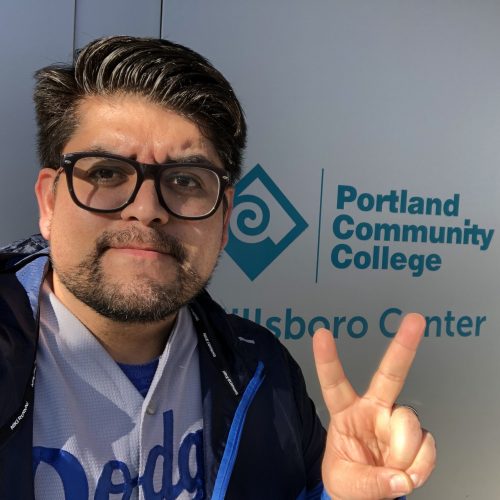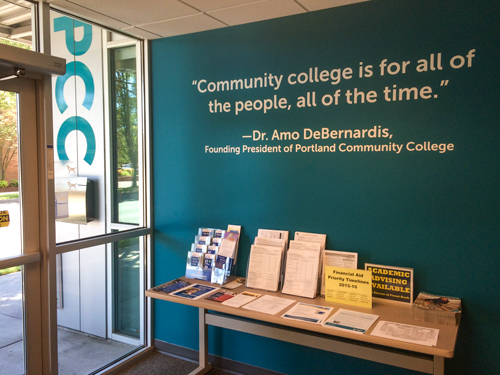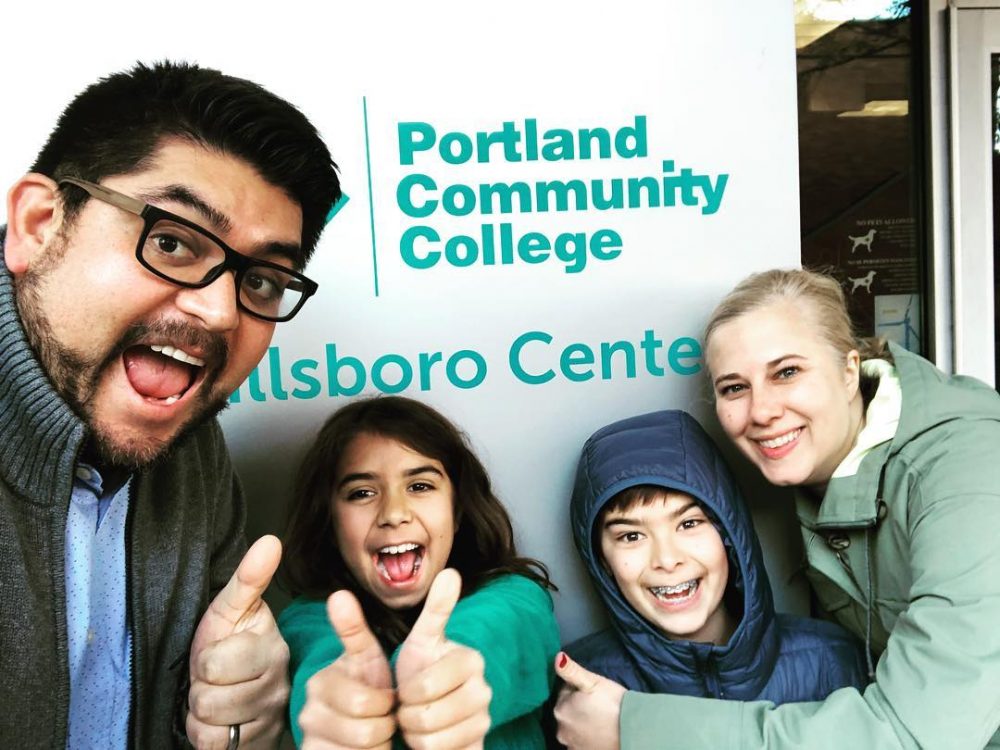This content was published: April 1, 2021. Phone numbers, email addresses, and other information may have changed.
Profiles From a Distance: José Esparza reflects on his outreach efforts in Washington County
Photos and Story by Alfredo V. Moreno
There is a quote on the wall of the Hillsboro Center by founding Portland Community College President Dr. Amo DeBernardis — “Community college is for all the people, all the time.” It’s a moving statement for all, including the center’s director, José Esparza.
“I love it because I remember the first time I saw it, I knew I was home,” Esparza said. “That reaffirms what I feel so strongly.”
Almost 20 years ago, PCC opened its Hillsboro Center with the goal of increasing educational access for all Washington County residents. In 2010, PCC’s center grew so much it was moved from its 9,000-square-foot office space at 102 S.W. Washington St. to the Intermodal Transit Facility on Baseline. Today, the center offers a variety of university transfer courses, professional/technical classes, developmental reading, writing and math, as well as English For Speakers of Other Languages classes.
As the college engages in a comprehensive reorganization during its simultaneous rollout of a new strategic plan for the next five years, it finds itself tapping new leaders to help guide internal and external projects and efforts like community outreach. Esparza is a key actor in this work and is looking to bolster partnerships with existing stakeholders to further grow the Hillsboro Center.
A proud first-generation community college graduate and a co-founder of the Mente Summit, Esparza has dedicated nearly two decades to helping students access and navigate higher education, while also helping colleges better understand the diverse needs of Latinx, first-generation, low-income and other underrepresented students. He started at PCC as a college success coach and outreach and recruitment coordinator for the Future Connect Scholarship Program.
Esparza took a moment to discuss his plans for the center.
What is your plan to connect with under-represented populations?
Esparza: Just getting more involved, starting with the students themselves and figuring out the needs in western Washington County. I learned that a lot of students just need something as simple as someone to help them understand how to fill out the PCC admissions form, someone to help them complete their financial aid application. And with low income students, it’s like, if you’ve got no money, you’re just not going to go to college. Very few students know that if you’re low income, basically all your school is paid for at PCC.
But overall, I think both the community and the college just wanted a bigger presence. A lot of people , including local leaders and even some in the school district, just weren’t fully aware that there was a Hillsboro Center or what exactly we did. So, increasing awareness was a top priority.
Did you learn anything new about the students the center serves?
Esparza: In my first year, I surveyed all the students — day and evening students — to learn about their needs and roughly 75% of them said that they were first generation college students. Almost 80% of them said that they first looked for classes at the Hillsboro Center and if they couldn’t find them, then they would go to Rock Creek. We also learned that the majority of students have jobs and that transportation to Rock Creek is a major obstacle for students. So after that, I really got to work advocating to make sure that we’re offering the right classes at the center. And that’s still something I’m working hard to accomplish, expanding the course offerings to meet the community need.
You’ve also been heavily involved in outreach efforts. How has that gone?
Esparza: Typically, center directors aren’t really involved in outreach, but that’s something that, to me, was important. Basically, telling my staff, “Don’t wait for them to come to us, we go to them and see how we can help.”
A lot of the work included identifying and proactively reaching out to students who had applied for admission at PCC, but never enrolled. We reached out to those students and we asked what happened. And a lot of them were saying, “I just didn’t know what to do.” They didn’t know they had a MyPCC account or a PCC email address they were supposed to check, for example.
Steven Swint (center coordinator and advisor), Erika Ramirez (evening coordinator) and I began helping people understand the process and providing support all the way through. And even now, in this remote environment, we’re still continuing that work as much as possible.
How did this effort impact enrollment?
Esparza: I guess that’s the thing we’re most proud of is that we were one of the few places that actually saw an enrollment increase from the previous year (prior to the pandemic). So that’s a testament to the environment and support that we provide students at the center. Our staff has a checklist so when somebody comes in for something, we ask follow-up questions to see what else they might need to do to complete their admission and enrollment process. If they haven’t, we set up appointments to get that done. We shifted to become a one-stop center.
We’ve had Spanish-speaking parents come in with an adult child to help with translation and we help the parent, but then also ask their son or daughter what they’re doing for work and if we can help them enroll in college. That extra effort to provide a positive experience for an incoming new student.
During the pandemic, have you worked on any projects or hobbies?
Esparza: The pandemic gave me the opportunity to hit the reset button and focus on what’s important to me – my family and my health. My wife, Schay, and I have a fifth- and an eighth-grader at home. The time together has allowed us to reconnect and prioritize each other. We hate having to wash dishes and clean the kitchen every day but it has been nice having all meals together as a family. My health has also been a highlight. Before the pandemic I weighed over 300 pounds and had diabetes. Thanks to a new NordicTrack treadmill and free OEBB Weight Watchers, I’m now an avid runner and have lost over 50 pounds. I went from not being able to run one mile to running over 170 miles these past two months — oh, and no more diabetes for me.
What are you looking forward to doing most post-pandemic?
Esparza: Seeing students at the Hillsboro Center again is on my list, but I’m really looking forward to being able to travel and see my out-of-state relatives again. Last spring break was supposed to be spent visiting extended family in Jalisco, Mexico that I haven’t seen in over 20 years and that my wife and kids have never met. My kids only know beach and resort Mexico, so they need to experience the parts where you have to take a shower and flush a toilet with a water bucket.
What’s something you enjoy doing in your free time?
Esparza: My wife told me to say that I’m a good cook. I’d rather you know that I really enjoy coaching youth sports. I’ve been a baseball coach for the last 10 years and I began coaching softball for South Beaverton Girls Little League three years ago. I really hope kids get a chance to play ball this upcoming season.
Thank you José!





I hope this Hillsboro center becomes bigger than just professors and books. It need to gets equipment that reflects both the medical and technical (silicon forest) jobs. I commuted past the Hillsboro Center to reach Sylvania campus just to learn Electrical Engineering a skillset needed in Hillsboro area. Had the Hillsboro center had electronic equipment labs there may have been more local engineers. If I had to do it again, I do not know if I would make the commute from north-western Hillsboro to Sylvania.